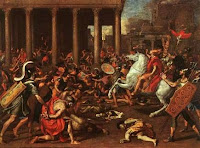Acts 11:1-18; John
13:31-35
I want to start today by talking about the
meaning of Gentiles. We usually think of them as non-Jews. In the Old
Testament, non-Jews were treated well, even though they were recognized as
different.
Because of this persecution, the Jewish people
began to fear any outsiders. They began to be more resistant to outsiders, to
Gentiles. Food rules had always separated them from others, as did
circumcision. By the time of Jesus, a Gentile was an enemy.
Jesus spoke frequently with Gentiles and made it
clear that they were among those whom God loved. Even the disciples wondered if
he really meant it, to love everyone.
This wonderful story in today’s reading from Acts
is a sort of a summary of a longer narrative. Peter is now in Jerusalem after
being in Joppa – near where he raised Tabitha from death. While there, Peter
had a vision – three times the same vision.
He sees a large tablecloth covered with food Jews
never eat, but which are tasty dishes for Gentiles. In the vision, Peter is
told to take and eat, and Peter refuses. He declares that he never eats unclean
food. But he is told again to take and eat. And, What God has made you must not
call unclean.
Finally, Peter gets the message. He is sent to
the home of Cornelius in Caesarea, where he converts the entire household and
baptizes them. The good news of the resurrection is for the Gentiles as well as
the Jews. Further, he gets the message that Gentiles are not unclean; they are
also children of God. They, too, are to be baptized with the Holy Spirit.
This is a huge change for these Jewish Christians.
Must believing Gentiles be circumcised? Must they obey Jewish food laws?
Eventually, the answer will be no to both, but it will be a hard-fought battle
within the community. In the end, they remember God’s words. What God has made
you must not call unclean. And: Just
as I have loved you, you also should love one another.
Do we believe that people of color are equal to
the dominant white people?
Do we believe that immigrants, documented and
undocumented, are God’s children, whom God loves, who deserve to be treated
with respect?
Do we ordain homosexual people with partners and
accept that the Holy Spirit speaks to and through them?
Do we accept that God, our One God, has many
names and revelations and that people worship their God with the same faith and
passion that we do?
It takes time, and conversation, and prayer. It
takes listening to God remind us what God said to Peter and Paul so long ago. Love
as I love, and do not make unclean that which I have made clean.
As a woman and as a female pastor, I can tell
stories of rejection, of being treated as a sort of Gentile, because of who I
am. You know my story here at Hope. Here’s a different story. In my first job
after college, I was told that John, who was hired six months after I was, got
paid more because he had a family. In truth, he was a newly-wed. I had two
children, and my income fed the four of us. But, I was a female, so not worth
as much.
Others have told me their rejection stories. For
example, I remember Inez telling me how as a child she tried to scrape the
brown color from her skin so she looked more white. Being treated as a Gentile
is painful.
But I have also heard stories of welcome for
Gentiles.
May the children of the stock
of Abraham who dwell in this land continue to merit and enjoy the good will of
the other inhabitants — while every one shall sit in safety under his own vine
and fig tree and there shall be none to make him afraid. May the father of all mercies scatter light, and not
darkness, upon our paths, and make us all in our several vocations useful here,
and in His own due time and way everlastingly happy.
There has been a lot of conversation about the US
accepting Syrian refugees. One of the destinations for them is Dearborn,
Michigan, where Iraqis, Syrians, and other Arab peoples have been settling for
decades.
In such communities, new immigrants have a
familiar cultural setting in which to make a new home. Mahmoud Karaz and his
family fled Homs after a house bombing killed two relatives. They spent three
years in Jordan, with no real home, before being able to come to Michigan.
These Gentiles know there is no way they can return to Syria, and look forward
to making the US their new country.
This week, ask yourself how well you love. Notice
the way you label some people as unclean, as Gentiles, even if you really don’t
want to. Find a way, even if only in your imagination, to love the Gentiles. Remember,
Jesus loves them, why shouldn’t we?
Please pray with me. Lord of love, we give thanks
for your love for us. Help us to love others, including those we think of as
Gentiles. Forgive us for our lack of love. In your holy name, we pray. Amen







No comments:
Post a Comment